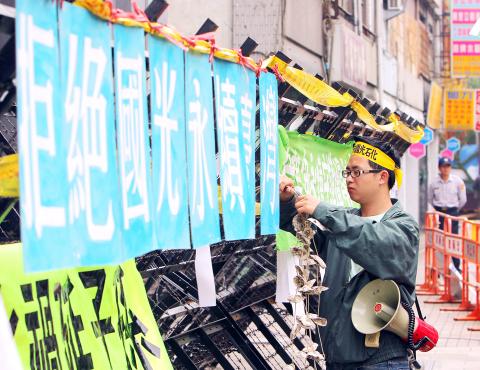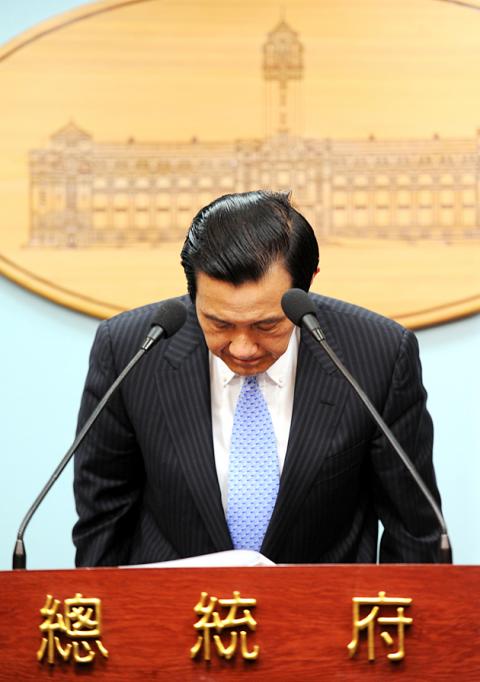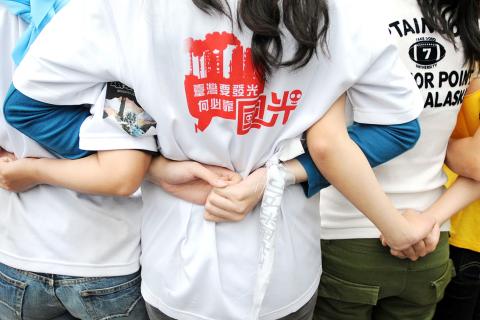A review taskforce yesterday failed to reach a final conclusion on the future of a proposed Kuokuang Petrochemical Technology Co’s (KPTC, 國光石化) naphtha cracker complex and proposed two scenarios to be evaluated by the Environmental Impact Assessment (EIA) Committee next month, a decision that did not please environmentalists.
EIA Committee member Chiang Pen-chi (蔣本基), who presided at the meeting, said the two options were that the committee either reject the project, which was planned to be constructed in Dacheng Township (大城), Changhua County, or give it conditional approval. In all, 11 reasons were given as to why the project should be abandoned and 24 conditions were listed if conditional approval were given.
About 40 minutes after the second day of meetings by the taskforce concluded at 3pm, President Ma Ying-jeou (馬英九) told a press conference at the Presidential Office that he opposed building the project in Changhua County.

Photo: CNA
Leading top government officials in explaining the government’s position on the matter, Ma said the complex, which was to be built in a wetland area, would have an “unbearable” impact on the local ecology and environment, and that the government should take the initiative in halting the project.
“The impact caused by the complex would be unbearable for the town and its people, and as an arbiter, it’s time for us to declare our stance,” Ma said.
“However, we will not and cannot give up on the petrochemical industry,” he said, adding that the Cabinet would start a thorough examination on the development of the industry.

Photo: Lo Pei-der, Taipei Times
Ma said the Council of Economic Affairs would instruct state-run refiner CPC Corp, Taiwan (CPC, 台灣中油), the largest shareholder of KPTC, to reject building the complex in Changhua during a shareholders’ meeting next week.
CPC Taiwan holds 43 percent of Kuokuang’s shares, with the remaining 57 percent held by private investors.
“I know [halting the project] is a difficult decision to make and the decision will have a substantial impact on the petrochemical industry and Dacheng Township,” Ma said. “However, the decision gives us a chance to seek balance between economic development and environmental protection.”

Photo: Wang Yi-sung, Taipei Times
Ma said the decision was made after a series of discussions on the issue with environmental groups, local residents and experts. He denied the decision was made to please local residents for electoral purposes.
Ma accused the Democratic Progressive Party (DPP) of planning the complex and leaving the thorny issue for his administration, adding that his administration took the responsibility to solve the problem when it was determined that the proposed site was inappropriate.
The Council of Economic Affairs will also assist KPTC in weighing other options, including moving the complex abroad, while helping the township create more employment.
Minister of Economic Affairs Shih Yen-shiang (施顏祥) said it would be difficult to find another location in Taiwan for the complex, which required a large plot of land, but declined to confirm whether the ministry would move the project to another country.
When asked about the negative impact of the halted complex on the local economy and the development of the petrochemical industry, Shih said the ministry would ensure the supply chain remained sufficient, adding that a cross--departmental discussion on the development of the industry would be held.
Yesterday’s decision by the taskforce and Ma’s announcement were met with a cool response from environmental activists, who had staged sit-in protests in front of the Environmental Protection Administration (EPA) for three days.
After the ruling, protesters called yesterday “a sad Earth Day.”
Representatives said they refused to buy Ma’s declaration and said his exclusion of Changhua from the list of possible sites for the proposed complex was simply intended to shift the focus of the issue.
The environmentalists refused to meet Ma at a traditional meeting to observe Earth Day and instead held a demonstration outside the Presidential Office to demand that the project be scrapped altogether.
Although Presidential Office spokesman Lo Chih-chiang (羅智強) tried to soothe the angry crowd and invite some of them into the office, they refused the offer and insisted they would not make any concessions over the matter.
The discontent also spread to two experts on the taskforce — Chan Chang-chuan (詹長權) of National Taiwan University and James Liu (劉祖乾) of National Chung Shan University — who said they were not pleased with the turn of events.
“The ruling was pre-determined and deviates from professional judgment,” Chan said. “This sets a bad example for the public. How could such an irresponsible and equivocal decision be made?”
Chan also accused Chiang of being reluctant to put the project to a vote, adding that the way Chiang interpreted the information differed markedly from most people’s understanding.
Commenting on the ruling, KPTC chairman Chen Bao-lang (陳寶郎) said the company would carefully study the terms of the ruling and then discuss them with its shareholders.
The EIA committee has held 24 meetings over the location of the plant. While experts on the committee have evaluated the project’s negative impact on the environment, Chen said they have never addressed the positive contributions the project would make to the economy.
Asked whether the company was contemplating other locations for the complex, Chen said the company had yet to discuss such options.
However, sources at the EPA said KPTC was likely to drop the bid before the EIA members meet at the general assembly next month, as Ma had clearly indicated his stance on the issue.
ADDITIONAL REPORTING BY CNA

The CIA has a message for Chinese government officials worried about their place in Chinese President Xi Jinping’s (習近平) government: Come work with us. The agency released two Mandarin-language videos on social media on Thursday inviting disgruntled officials to contact the CIA. The recruitment videos posted on YouTube and X racked up more than 5 million views combined in their first day. The outreach comes as CIA Director John Ratcliffe has vowed to boost the agency’s use of intelligence from human sources and its focus on China, which has recently targeted US officials with its own espionage operations. The videos are “aimed at

STEADFAST FRIEND: The bills encourage increased Taiwan-US engagement and address China’s distortion of UN Resolution 2758 to isolate Taiwan internationally The Presidential Office yesterday thanked the US House of Representatives for unanimously passing two Taiwan-related bills highlighting its solid support for Taiwan’s democracy and global participation, and for deepening bilateral relations. One of the bills, the Taiwan Assurance Implementation Act, requires the US Department of State to periodically review its guidelines for engagement with Taiwan, and report to the US Congress on the guidelines and plans to lift self-imposed limitations on US-Taiwan engagement. The other bill is the Taiwan International Solidarity Act, which clarifies that UN Resolution 2758 does not address the issue of the representation of Taiwan or its people in

US Indo-Pacific Commander Admiral Samuel Paparo on Friday expressed concern over the rate at which China is diversifying its military exercises, the Financial Times (FT) reported on Saturday. “The rates of change on the depth and breadth of their exercises is the one non-linear effect that I’ve seen in the last year that wakes me up at night or keeps me up at night,” Paparo was quoted by FT as saying while attending the annual Sedona Forum at the McCain Institute in Arizona. Paparo also expressed concern over the speed with which China was expanding its military. While the US

SHIFT: Taiwan’s better-than-expected first-quarter GDP and signs of weakness in the US have driven global capital back to emerging markets, the central bank head said The central bank yesterday blamed market speculation for the steep rise in the local currency, and urged exporters and financial institutions to stay calm and stop panic sell-offs to avoid hurting their own profitability. The nation’s top monetary policymaker said that it would step in, if necessary, to maintain order and stability in the foreign exchange market. The remarks came as the NT dollar yesterday closed up NT$0.919 to NT$30.145 against the US dollar in Taipei trading, after rising as high as NT$29.59 in intraday trading. The local currency has surged 5.85 percent against the greenback over the past two sessions, central